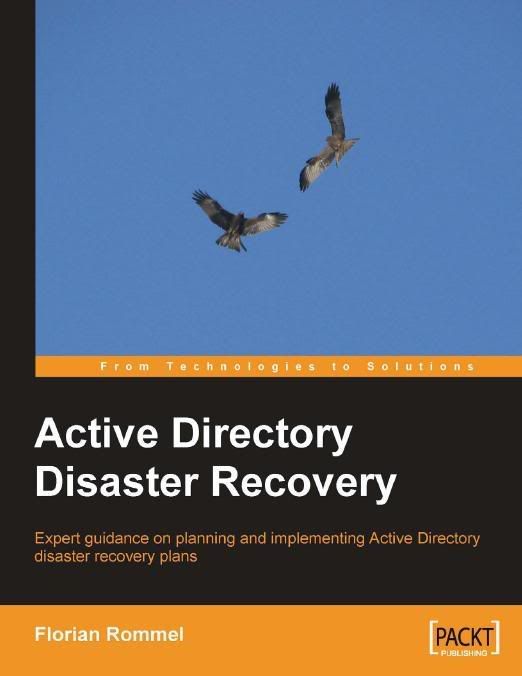
Murphy's law states that anything that can go wrong will go wrong. In relation to Information Systems and Technology this could mean an incident that completely destroys data, slows down productivity or causes any other major interruption of your operations or your business. How bad can it get?—"Most large companies spend between 2% and 4% of their IT budget on disaster recovery planning; this is intended to avoid larger losses. Of companies that had a major loss of computerized data, 43% never reopen, 51% close within two years, and only 6% will survive long-term." —Jim Hoffer, Backing Up Business – Industry Trend or Event.
Active Directory (AD) is a great system but it is also very delicate. If you get a problem, you will need to know how to recover from this situation. You will need to know about Disaster Recovery and be prepared with a business continuity plan. If Active Directory is a part of the backbone of your network and infrastructure, the guide to bring it back online in case of an incident needs to be as clear and concise as possible. If all of this happens or if you want to avoid all of this happening, this is the book for you.
Recovering Active Directory from any kind of disaster is trickier than most people think. If you do not understand the processes associated with recovery, you can cause more damage than you fix. This is why you need this book.
This book has a unique approach—the first half focuses on planning and shows you how to configure your AD to be resilient; the second half is response focused and meant as a reference in which we discuss different disaster scenarios. We follow a Symptom-Cause-Recovery approach—so all you have to do is follow along and get back on track.
This book describes the most common scenarios and how to properly recover your infrastructure from them. It contains commands and steps for each process and contains information on how to plan for disaster and how to leverage technologies in your favor in case of a disaster.
Active Directory (AD) is a great system but it is also very delicate. If you get a problem, you will need to know how to recover from this situation. You will need to know about Disaster Recovery and be prepared with a business continuity plan. If Active Directory is a part of the backbone of your network and infrastructure, the guide to bring it back online in case of an incident needs to be as clear and concise as possible. If all of this happens or if you want to avoid all of this happening, this is the book for you.
Recovering Active Directory from any kind of disaster is trickier than most people think. If you do not understand the processes associated with recovery, you can cause more damage than you fix. This is why you need this book.
This book has a unique approach—the first half focuses on planning and shows you how to configure your AD to be resilient; the second half is response focused and meant as a reference in which we discuss different disaster scenarios. We follow a Symptom-Cause-Recovery approach—so all you have to do is follow along and get back on track.
This book describes the most common scenarios and how to properly recover your infrastructure from them. It contains commands and steps for each process and contains information on how to plan for disaster and how to leverage technologies in your favor in case of a disaster.
